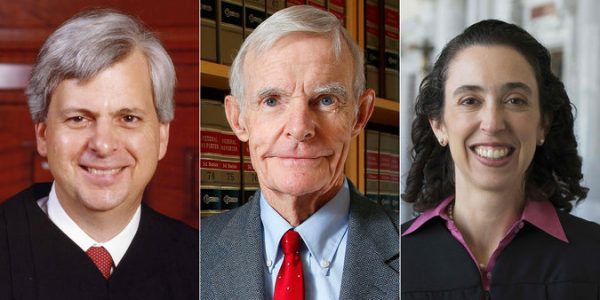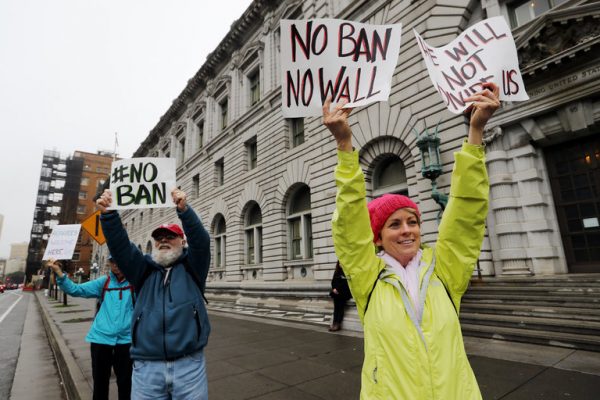
A three-judge federal appeals panel voiced skepticism on Tuesday at the Justice Department’s broad defense of President Trump’s targeted travel ban during arguments over how much power the president has to impose immigration restrictions based on national security concerns.
It was a lively but technical hearing on an issue that has gripped much of the country’s attention — and that of foreign allies and Middle East nations — for the past week. Issued without warning on Jan. 27, just a week after Mr. Trump took office, the executive order disrupted travel and drew protests at the nation’s airports by suspending entry for people from seven predominantly Muslim countries and limiting the nation’s refugee program.
No matter how the United States Court of Appeals for the Ninth Circuit rules — in an order that is expected within days — an appeal to the United States Supreme Court is likely. That court remains short-handed and could deadlock. A 4-to-4 tie in the Supreme Court would leave the appeals court’s ruling in place.
Several courts around the nation have blocked aspects of Mr. Trump’s order, but the broadest ruling was the one at issue on Tuesday in the Ninth Circuit.
The three-judge panel was considering an earlier ruling by Judge James Robart of the Federal District Court in Seattle, which allowed previously barred travelers and immigrants to enter the country.
“Are you arguing, then, that the president’s decision in that regard is unreviewable?” Judge Michelle T. Friedland asked.
The Justice Department lawyer, August E. Flentje, paused. Then he said yes.
Another judge, Judge William C. Canby Jr., asked, “Could the president simply say in the order, ‘We’re not going to let any Muslims in?’”

Mr. Flentje said two states that have sued over Mr. Trump’s executive order would be powerless to challenge such a hypothetical. He added others might be able to sue on religious discrimination grounds.
The attorney for Washington State, Noah G. Purcell, fared little better in fending off questions from Judge Richard R. Clifton, who said the states’ evidence of religious discrimination was thin.
The case, State of Washington v. Trump, is in its earliest stages, and the question for the appeals court on Tuesday was a narrow one: Should it stay Judge Robart’s temporary restraining order and reinstate the travel ban while the case proceeds?
The argument, which lasted about an hour, was conducted over the telephone and was streamed live on the website of the court. In a media advisory issued before the argument, the court said that “a ruling was not expected to come down today, but probably this week.”
Mr. Flentje urged the appeals court to issue an emergency stay. He said the executive order was plainly constitutional and beyond the power of the court to second-guess.
“This is a traditional national security judgment,” he said, “that is assigned to the political branches.”
He was pressed about whether the executive order was supported by evidence of real and new threats.
“Has the government pointed to any evidence connecting these countries to terrorism?” asked Judge Friedland, who was appointed by President Barack Obama.
Mr. Flentje said the government had not had an opportunity to present evidence in court given the pace of the litigation.
Judge Friedland responded that the government’s appeal may be premature.
Mr. Flentje said the travel ban was well within Mr. Trump’s legal authority. A federal statute specifically gives presidents the power to deny entry to aliens whose presence would be “detrimental to the interests of the United States,” he said.
He added that the court should not probe Mr. Trump’s motives, confining itself instead to “the four corners of the document.”
“It’s not an order that discriminates in a way on the basis of religion,” Mr. Flentje said.
Mr. Purcell responded that the purpose of the executive order was religious discrimination. Mr. Trump has said he meant to favor Christian refugees. “The court can look behind the motives,” he said.
Perhaps sensing that he was unlikely to achieve a complete victory, Mr. Flentje offered the court a middle ground. He asked, at a minimum, for the judges to reinstate the part of the order that applied to people who have never been in the United States, calling this a “really key point.”
Reading from a brief, he said that at most the executive order should be blocked as to “previously admitted aliens who are temporarily abroad now or who wish to travel and return to the United States in the future.”
Judge Clifton, who was appointed by President George W. Bush, said that only a small fraction of the world’s Muslims were affected by the order, suggesting that he was unconvinced that its effect was religious discrimination
Judge Friedland said that if the order violated the Constitution’s ban on government establishment of religion, the court could block it completely.
NY TIMES

Leave a Reply
You must be logged in to post a comment.